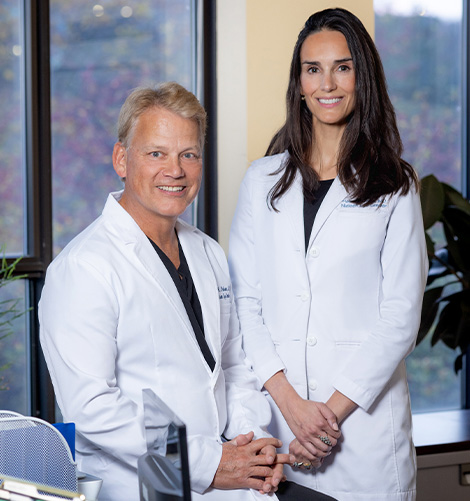6 Questions To Ask Your Eye Doctor At Your Next Eye Exam in Bostonin Boston, MA

Eye exams are routine, or at least they should be! Whether you have a routine eye exam or you have an issue with your eyes you want to have looked at, it’s good to know what you should ask your eye doctor during your eye exam.
Your eye care professional can give you a lot of information, but it’s essential to ask the right questions so you can make sure you’re getting what you need. Keep reading to learn the top 6 questions to ask your eye doctor at your next eye exam in Boston!
1. Do You Have My Full Medical History?
An excellent place to start with an eye exam is making sure your ophthalmologist has your full medical history. Sending patient information between doctors and specialists can be tricky, especially if you’ve just moved or are seeing a new eye doctor.
Even if you’ve signed the proper release forms from both offices, it’s easy for things to get mixed up. The best thing to do is make sure that whoever you’re seeing has your medical history.
Many general health problems can put you at increased risk for various eye conditions. If you’ve filled out your medical history as a new patient, that information isn’t always up-to-date if you’ve been seeing the same eye doctor for a while.
If your doctor doesn’t have your information, the easiest way to rectify the problem is by giving it to them yourself. Make sure you know your medical history and any medications you’re taking ahead of time.
If you take several medications, it may be simpler to write down any you’re taking and bring the list with you. This will also save you some time during your appointment with your eye doctor!
2. What Tests Will You Be Doing Today?
It’s good to know what a comprehensive eye exam entails and why your eye doctor will perform each test. It’s excellent to have this information when your eye exam isn’t routine.
If you’re experiencing issues with your vision, knowing what possible causes your doctor will be looking into can help you better understand what’s causing them. If you’re nervous before your eye exam, knowing what tests to expect can also help calm you down and lessen any anxiety you may be feeling.
3. Will You Be Dilating My Eyes Today?
During eye exams, eye doctors often give their patients eye drops to better see into their eyes. The medication used for this dilates the eyes allowing them to see your retina, macula, optic nerve, and the back of your eye.
For patients of all ages, this dilated eye exam is pretty routine. Although you may be familiar with having your eyes dilated, it’s not always something that you’ll have performed at every eye exam.
If you can, you may want to find out in advance if you’ll be having your eyes dilated, as you probably won’t want to go back to work or school after. Your eyes will be more sensitive to light, making it difficult to drive or work on a computer for a few hours.
This way, you’ll also be able to bring a pair of sunglasses to make dealing with light a little more bearable, or you may be able to find someone that can pick you up and drive you home. Having your eyes dilated isn’t painful, but knowing it’s happening will help you be more prepared instead of being taken off guard when you need to have your dilated eye exam for a comprehensive eye exam.
4. What Do My Symptoms Mean?
Many minor issues can affect our eyes, from itchiness to allergies and strain from too much screen time or contact lens discomfort. It’s essential to list any discomfort you’re experiencing, no matter how minor it seems.
Sometimes, these symptoms indicate a straightforward issue that goes away over time or one you can treat with over-the-counter medication. But sometimes, they can show a condition that requires more extensive treatment.
Ask your eye doctor what your symptoms could indicate to take the steps you need to alleviate them.
5. Should I See An Optometrist or An Ophthalmologist?
An ophthalmologist is a medical doctor that specializes in eye diseases and surgeries. In many cases, if you see an eye doctor, you see an optometrist, but that’s not always true.
You may see an ophthalmologist as well. It depends on the eye care practice and who your eye doctor is. Optometrists and ophthalmologists can give routine eye exams, but an optometrist has a doctor of optometry degree and did not attend medical school.
Ophthalmologists usually specialize and can treat conditions like dry eye syndrome, glaucoma, and cataracts. They can also perform vision correction procedures like LASIK.
At many practices, you’ll find both optometrists and ophthalmologists working together in a team setting. If you see an optometrist for an eye exam and they suspect you have an eye condition, they will likely refer you to an ophthalmologist as a next step.
6. What Can I Do to Keep My Eyes Healthy?
You can always ask your eye doctor for general tips about staying healthy. They may start with the obvious things like exercising and eating a healthy and well-balanced diet.
But they may have more insights, especially into what kinds of foods to eat. This may include eating more foods that contain omega-3 fatty acids or drinking more water throughout the day if your eyes are dry.
They can also recommend nutritional supplements and over-the-counter medication that can relieve daily issues like allergies and may even provide samples to try as well.
But the most important thing to do when it comes to keeping your eyes healthy is to see your eye doctor regularly. Many people put off visiting their eye doctor for their annual eye exam.
While it may seem unnecessary to see an eye doctor if your eyes seem healthy, many eye conditions show no signs in the early stages. Early detection can only be done during an eye exam, and it can save your vision.
When you decide to make your eyes a priority, it can only lead to good things! If you’re not sure when your last eye exam was, it’s never too late to make 2021 the year that your eyes take center stage! Schedule an appointment at Nielsen Eye Center in Boston, MA, today!
Our dedicated Patient Advocates are patiently waiting by the phone, so give them a call at 617-471-5665 and schedule your eye exam now!
You’ve only got one set of eyes, so why not treat them with the tender, loving care they deserve?






